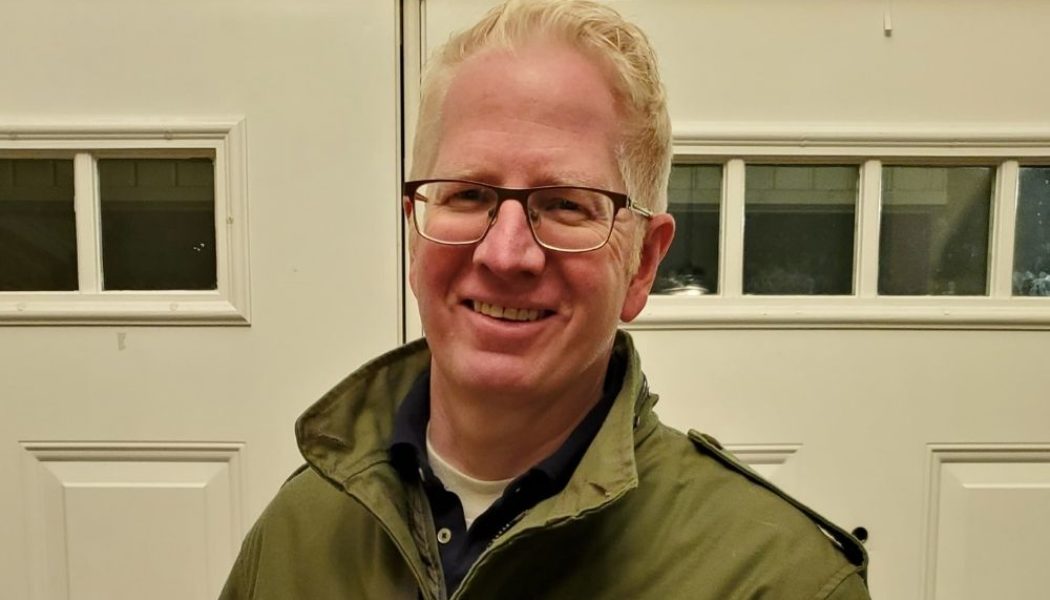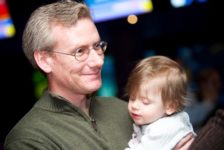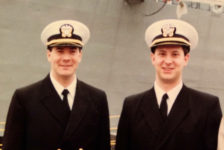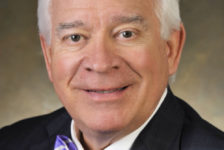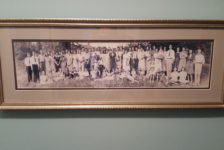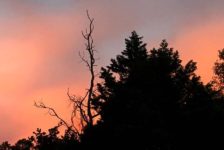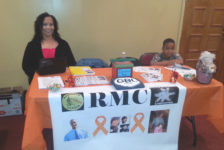My kidney cancer was found shortly after I saw blood in my urine in December of 2010. Like everyone else who gets a cancer diagnosis, I experienced the sickening anxiety of being informed I had a suspicious mass.
In my case, I was told over the phone by a urology PA that the ultrasound had detected a “large mass” in my right kidney that was probably malignant. A radical nephrectomy (laparoscopic) followed. The tumor, about 9 cm but contained within the kidney, was identified as being clear cell renal cell carcinoma (CCRCC), stage 2.
Annual CT scans proceeded along without incident for several years. Though I would have the natural anxiety when getting scan results, I had moved on from cancer psychologically and imagined a life without it. About four and a half years after my nephrectomy, in summer 2015, one of these routine scans found that cancer was in my right adrenal gland. That organ was removed, with the tumor identified as ccRCC.
Two years later, in late summer 2017, I had another ccRCC tumor about the size of a golf ball surgically removed from my psoas muscle, and (in a different surgery) I had about three small ccRCC tumors (1 to 2 cm) surgically removed from my left lung. Another small tumor that was removed from my left lung was identified by the pathologist as adenocarcinoma of the lung (stage 1). This of course was horrifying, as I contemplated the problems of trying to have two different types of cancer treated at once. For the record, I have never used tobacco, alcohol, or illegal drugs. Fortunately, the lung cancer has not returned.
At this point, fall 2017, I entered a monitoring phase with a medical oncologist, with scans every 3 months. This was the first time I had been referred to a medical oncologist (I had seen only surgical oncologists to that point). Looking back, I wonder if I should have been referred to a medical oncologist earlier, though in those earlier years I understand ccRCC patients did not typically (or ever?) receive systemic drug therapies if they were in stages 1 or 2. So maybe seeing a medical oncologist would have been pointless initially.
Anyway, within a year, by fall 2018, the cancer had spread again. Another tumor had grown on my psoas muscle, perhaps the size of an egg, and there were multiple small nodules (1 to 2 cm) in both lungs and a couple small nodules in lymph nodes in the area of the sternum. I started on Yervoy/Opdivo therapy that fall and had no noticeable side effects. I was really hopeful that I would be one of the patients for whom this miraculous new therapy worked, which I knew was about the only chance of achieving a state of NED for a long period of time.
After my fourth treatment, blood tests detected abnormal liver enzymes, an indication of autoimmune hepatitis triggered by the immunotherapy. The treatment was stopped. At about that same time, I got a CT scan. It showed possible pseudoprogression. I held onto hope it was psuedoprogression, but another scan 2 or 3 months later showed actual progression in some areas but with reduction in some tumors. So, a mixed result. As I recall, one of the lung nodules that had grown was biopsied at this time by a interventional pulmonolgist to see if I had lung cancer again. The biopsy showed that the tumor was ccRCC (and I learned that even an outpatient biopsy can be a miserable experience—I really didn’t enjoy waking up from the anesthesia after this particular surgery).
I then was fortunate to enroll in a clinical trial at Huntsman Cancer Center in Salt Lake City with Dr. Benjamin Maughan as my medical oncologist. Even though we later learned the trial drug did not prove effective in the study, I say I was fortunate because I have received wonderful, compassionate care from Dr. Maughan and the nurses and other specialists there. The trial offered cabozantinib, a targeted therapy known to be highly effective, in combination with placebo or Telaglenastat (CB-839).
I did not realize when signing up for the clinical trial that I would be taking on certain extra requirements, such as logging my medications daily or needing to avoid certain medications because of possible interference with the study drug. In any case, and though of course I didn’t know if I was getting the study drug or not, I was grateful to have the 50/50 possibility of getting a potentially helpful second drug as well as to help move cancer research forward in this small way.
I started on 60 mg of cabo in April 2019. The doctor told me that the side effects typically start to show up within 30 days. The first 29 days weren’t too bad, but then on the 30th day, literally, it was like a signal went off that side effects could now start appearing in full force. Side effects I experienced at that time or shortly thereafter included significant loss of appetite, extreme sensitivity to spicy food (including mint toothpaste), the phenomenon of most food losing its taste and even having a kind of gross taste, gravel-sounding voice, muscle cramps, lightheadedness when exerting myself, significant fatigue, feeling of queasy stomach (or nausea), hand/foot syndrome, heartburn, dry skin, hair turning white, and hemorrhoids. There were probably other side effects I don’t remember at the moment. If I was receiving the study drug rather than placebo, that could have contributed to my misery.
The hand/foot syndrome was probably the worst side effect at first, along with the inability to enjoy eating food. After a while, diarrhea set in, and by fall 2019 it got really bad to where (in combination with reduced food intake) I lost probably 15 or 20 pounds. But it wasn’t bad enough to reduce the dosage, and other than the diarrhea most of the other side effects got more tolerable over time. The physician’s office provided the best information possible to treat the various side effects. I got Urea and the typical steroid cream for the hand/foot pains. I also used a lot of thick lotions like Eucerin, put gel pads in my shoes, wore cotton gloves at night and when driving, and avoided anything that could hurt my hands and feet.
I took Zofran 3 times a day, as prescribed. I took the antacids allowed. When the severe diarrhea came on, I changed to a very simple diet, almost the BRAT diet. That helped somewhat.
I wish I would have known earlier that I could take loperamide more liberally to help combat the diarrhea. Other than that, I am not sure that the physician and his staff could have helped me much more with the side effects. At some point I discovered Smart Patients and that helped, as did information from several Facebook groups I joined for kidney cancer survivors.
In January 2020, after being on the clinical trial for about 8 months, I had severe pains below my sternum (I compare these to being shot with a flaming arrow) and puked up blood. Through endoscopy it was found that I had esophagitis. The cabo was discontinued for a few weeks so my innards could recover. I resumed 60 mg in about February 2020, but the side effects came on strong, perhaps even worse than initially. The hand/food syndrome was especially bad.
Because of the hand/food syndrome, my physician reduced my dosage of cabo to 40 mg. I still experienced side effects but they were less severe than on the higher dosage. In July 2020 I had another episode of esophagitis (again found with endoscopy after severe pain and bloody vomiting) and again discontinued cabo for a few weeks. In August 2020 I resumed cabo again at 40 mg. At no point did I stop taking the study drug or placebo. Under the physician’s direction, I took additional antacids after the episodes of esophagitis.
In about January 2021 I was informed that the clinical trial for CB-839 had been discontinued by the drug manufacturer because the study had shown that the drug was not improving outcomes. Since the study had shown the study drug wasn’t making a difference, I was glad to not have to take the extra pills or to have to keep a drug diary. I was also able to switch over to a stronger antacid, omeprazole, which was not permitted long-term for patients on the study drug except. I am convinced that without being on omeprazole I would have already had additional episodes of esophagitis.
Anyway, I find myself now at the end of March 2021. I have been on cabo for almost two years. I realize that I am an outlier, that this drug typically works for only 7 to 10 months. I am extremely grateful to be able to tolerate it. My liver enzymes are a tad high but not dangerously so, and I have needed a thyroid medication. I also have recently experienced rapid tooth decay because of how cabo interferes with saliva production.
My physician suggests that I may be getting an unusually good result on cabo because of the earlier immunotherapy. This gives me some hope that perhaps it will be possible in my future to discontinue cabo without seeing disease progression. To have no evidence of disease (NED) without ongoing treatment is of course the fervent hope of every patient with metastatic cancer. Of course, we are nowhere near discontinuing cabo.
During this whole period of two years on cabo, I have been scanned at least every three months (chest and abdomen/pelvis). Within a few months of starting on cabo, all of the tumors that had been seen earlier disappeared. A couple of times a new nodule has appeared in a lung, but these have never grown, suggesting they were inflammation related to a viral infection or similar. At one point, in about October 2019, I had a biopsy on one of these nodules performed by the same interventional pulmonologist who had done a biopsy on me earlier that same year (with another miserable experience waking up in the recovery room). While we couldn’t be entirely sure that the pulmonologist had actually extracted the targeted tissue, the tissue that was removed was normal. And the targeted nodule never has grown again.
I have been fortunate to be able to work full-time the entire time I have been dealing with cancer, aside from taking off a few weeks for the surgeries. I have an office job with flexibility as far as when I work my 8 hours (plus) each day, so I have been lucky to be able to sleep in when needed or leave early when needed. I have sometimes needed to sleep 11 or 12 hours a day to deal with fatigue. Working exclusively at home during COVID has been an immense blessing.
I have also been fortunate to have good health insurance through my employer. While paying for scans and office visits and such costs me several thousand dollars a year, cancer has not wrecked our family’s finances.
I leave some thoughts about what has helped me in copying psychologically and emotionally with cancer.
First of all, I have never planned my funeral or “gotten my affairs in order.” I find those thoughts too depressing. If someone tells me someday that cancer is all over my body and there is no hope, that is when I will start planning for my funeral. Until then, I am planning to live.
Second, I have met (through Facebook and other sources online) many people who have lived with metastatic cancer for 10 years or much longer. Meeting these people and looking to their stories gives me hope. Even if you have metastatic cancer, that is not a death sentence. Never listen to a doctor who tells you how many months you have left, unless the situation is truly dire and they are going to put you on hospice. Statistics about survival rates tend to be outdated by a few years, meaning they are not based on the latest treatments. Also, statistics are based on overall populations, including people who may have been quite old or with other serious health problems. I have always thought, Well, if X number of the people with this disease can survive for a long time, why can’t I be one of that number?
I also hold out hope for new treatments that are being developed. I feel like if I can stay alive another five years, say, there will be some new treatment that could help me.
Third, friends and family have been a huge support to me. At points when I have been really frustrated or depressed (such as because of cancer spreading or the awful side effects of treatment), someone has often sent me a brief text out of the blue, or asked how I am doing. As a religious person, I see these kindnesses not only as evidence that people care for me but as evidence that God is aware of me and watching out for me. I pray a lot for guidance and peace.
As a cancer patient, one area where I would like to see the medical community do better is to integrate diet and other aspects of wellness with traditional treatments like surgery, radiation, chemotherapy, and targeted therapy. I believe in traditional treatments but I feel like they might be more effective if combined with latest findings from research into diet, meditation, sleep, etc.

